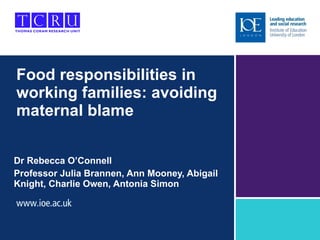Food responsibilities in working families: avoiding maternal blame
- 1. Food responsibilities in working families: avoiding maternal blame Dr Rebecca O ŌĆÖConnell Professor Julia Brannen, Ann Mooney, Abigail Knight, Charlie Owen, Antonia Simon
- 2. UK Headlines ŌĆś Working mothers' children unfit ŌĆÖ (BBC News Online, 2009) ŌĆś Moms' full-time work tied to childhood obesity ŌĆÖ (Reuters, 2010) ŌĆś Children of working mothers are telly tubbies: Obesity concerns for latchkey kids ŌĆÖ (Mail Online, 2010) ŌĆś Children with working mothers are six times more likely to be fat ŌĆÖ (Mail Online, 2011) ┬Ā
- 3. Food Practices and Employed Families with Younger Children Funded by ESRC/DH Oct 2009 - Sept 2011 Secondary analysis: National Diet and Nutrition Survey (NDNS, 2008/9), Health Survey for England (2007; 2008) and Avon Longitudinal Study of Parents and Children (ALSPAC) Intensive study of 48 working families sampled from the NDNS Overarching research question: ŌĆś How does parental employment influence and shape family food practices, in particular the diets of children aged 1.5 to 10 years? ŌĆÖ
- 4. Avoiding mother blame with a (feminist) sociological imagination (Ilta Garey and Arendell, 1999) Families are economically and culturally situated Ideas about children and families are historically and culturally situated Families have common and diverse interests
- 5. Concluding remarks ŌĆś The sociological imagination enables us to grasp history and biography and the relations between the two within societyŌĆÖ (Mills, 1959:6) In other words, ŌĆś the personal is political ŌĆÖ
- 6. Selected references Brannen, J. and Nilsen, A. (2005). Individualisation, choice and structure: a discussion of current trends in sociological analysis. The Sociological Review, 53: 412ŌĆō428 Ilta Garey, A. and Arendell, T. (1999). Children, Work, and Family: Some Thoughts on ŌĆśMother BlameŌĆÖ. Working Paper No.4. Center for Working Families, University of California, Berkeley Mason, J (2006). Mixing methods in a qualitatively driven way. Qualitative Research 6: 9-25 Mills, C.W., (1980), [1959]. The Sociological Imagination, London: Penguin Books. OŌĆÖConnell et al., (2010). Challenges, Innovations and Solutions in Family Food Practices: Linking qualitative and quantitative methods. Conference Paper, BSA Food Society and Public Health, British Library, July 2010





![Selected references Brannen, J. and Nilsen, A. (2005). Individualisation, choice and structure: a discussion of current trends in sociological analysis. The Sociological Review, 53: 412ŌĆō428 Ilta Garey, A. and Arendell, T. (1999). Children, Work, and Family: Some Thoughts on ŌĆśMother BlameŌĆÖ. Working Paper No.4. Center for Working Families, University of California, Berkeley Mason, J (2006). Mixing methods in a qualitatively driven way. Qualitative Research 6: 9-25 Mills, C.W., (1980), [1959]. The Sociological Imagination, London: Penguin Books. OŌĆÖConnell et al., (2010). Challenges, Innovations and Solutions in Family Food Practices: Linking qualitative and quantitative methods. Conference Paper, BSA Food Society and Public Health, British Library, July 2010](https://image.slidesharecdn.com/blpresentation-110330050432-phpapp02/85/Food-responsibilities-in-working-families-avoiding-maternal-blame-6-320.jpg)